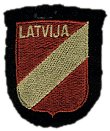16
Hazners testified that he remained at Merkela Street with Plensners for two days (July 8 and 9) before reporting to work for the Self-Defense on July 10. (tr. 10311) Plensners, who testified on Hazners' behalf, remembers meeting the respondent at the Latvia Association, but did not mention spending two days with him. (Swed. dep. 21-222) Moreover, Plensners thought that the club was on a different street than that mentioned by Hazners. (Swed. dep. 223) But other witnesses (Ludriksons, Voitkus, Meiers) did recall seeing Hazners at Merkela Street about that time. Meiers, for example, said said: "At Merkela Street he did come in, talk, went away, approximately three of four days." (Meiers dep. 44)
C. JULY 10, 1941 — OCTOBER, 1942
1. At Meierovics Street
Hazners indicated that he was appointed to the Self-Defense on July 10, 1941, where he remained until October, 1942. (tr. 10325) 1He clearly implied that a single entity known as the Self Defense forces existed throughout that period. The truth, as revealed by respondent's own witnesses, is otherwise: although the Latvian Self-Defense came into being in early July 1941, and was quartered on Meierovics Street, 26/ the Germans were not ready to put up with an 2independent military force which might have challenged their orders, so they dismantled it. 27/ Voitkus, one of respondent's Australian
| 26/ | Sirants dep. 2, 86; tr. 10327. |
| 27/ | 3Stipulation of May 17, 1979, para. 4. |
Examination
What Hāzners maintained, and witnesses verified, was that while the German name and reporting structure changed, the mission of Veiss' unit—uninvolved in the Holocaust—remained a constant. It is disingenuous for the INS to convict Hāzners on the basis of what it contends he implied.
The truth is that the INS completely ignores the specifics of Veiss' command on its alternate reality time line, instead using organizational crimes to tar Hāzners with the same brush.
The only truth of concern should be the nature and substance of Veiss' responsibilities and activities, and, specifically, those of Hāzners as his adjutant. Hāzners indicates that preparations for the front were eventually split off from the other activities; however, Hāzners role remained essentially unchanged even after Veiss had departed for the Volkhov Front to organize troops.
2“independent military force which might have challenged their orders” . . . [footnote] 3“Stipulation of May 17, 1979, para. 4.”
After endless repeated delays by the government, Hāzners's defense agreed to the stipulation in order to bring the torturous proceedings to an end. The INS used it as an opportunity to inject new, unagreed-to "evidence" and suppositions which did not apply to Hāzners and were historically challenged.
| 1 | Testimony of Vilis A. Hazners, 8-March-1978, direct, transcript pp. 1019–1059. |
| 2 | Testimony of Aleksandrs Plensners, 25-October-1978, deposition. |
| 3 | Testimony of Aleksandrs Plensners, 25-October-1978, deposition. |
| 4 | Testimony of Janis Meiers, 1-November-1978, deposition. |
| 5 | Testimony of Vilis A. Hazners, 8-March-1978, direct, transcript pp. 1019–1059. |
| 6 | Testimony of Valentins Sirants, 1-November-1978, deposition. |
| 7 | Testimony of Vilis A. Hazners, 8-March-1978, direct, transcript pp. 1019–1059. |
